c语言的头文件大全
c语言的头文件大全
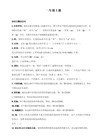
feof stdio.h
ferror stdio.h
fflush stdio. h
fgetc stdio.h
C标准库中所缺的函数可以从其它途径获得,例如编译程序开发商和第三方的函数库都会提供一些函数,这些函数都是事实上的标准函数。然而,标准库中的函数已经为程序设计提供了一个非常坚实的基础
12.1. 为什么应该使用标准库函数而不要自己编写函数?
标准库函数有三点好处:准确性、高效性和可移植性。
fwrite stdio. h
getc stdio.h
getchar stdio. h
getenv stdlib. h
gets stdio.h
abort stdlib. h
abs stdlib. h
acos math. h
asctime time. h
asin math. h
islower ctype. h
isprint ctype. h
ispunct ctype. h
isspace ctype. h
isupper ctype. h
fmod math. h
fopen stdio. h
FOPEN_MAX stdio. h
fpos_t stdio. h
fpnntf stdio. h
因此,你不用去寻找真正定义一个函数的头文件并使用这个文件,而应该使用那个被假定为定义了该函数的头文件,这样做是肯定可行的。
有几个名字在多个头文件中被定义:NULL,size_t和wchar_t。如果你需要其中一个名字的定义,可以使用任意一个定义了该名字的头文件((stddef.h>是一个较好的选择,它不仅小,而且包含了常用的宏定义和类型定义)。
C语言头文件使用大全
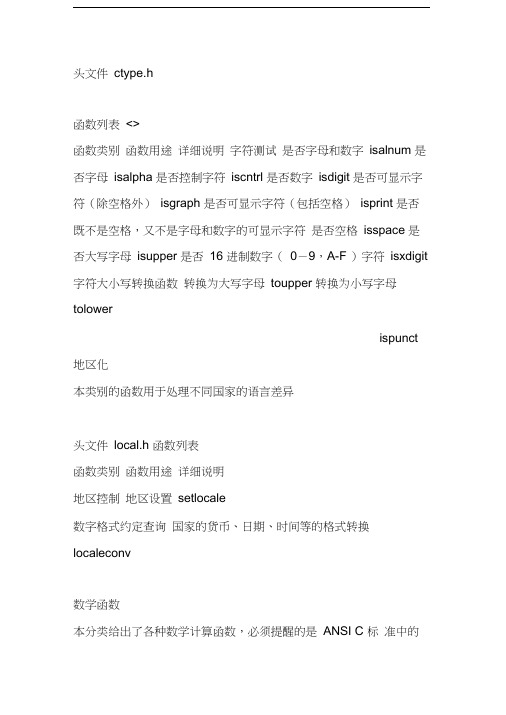
头文件ctype.h函数列表<>函数类别函数用途详细说明字符测试是否字母和数字isalnum 是否字母isalpha 是否控制字符iscntrl 是否数字isdigit 是否可显示字符(除空格外)isgraph 是否可显示字符(包括空格)isprint 是否既不是空格,又不是字母和数字的可显示字符是否空格isspace 是否大写字母isupper 是否16 进制数字(0-9,A-F )字符isxdigit 字符大小写转换函数转换为大写字母toupper 转换为小写字母tolowerispunct 地区化本类别的函数用于处理不同国家的语言差异头文件local.h 函数列表函数类别函数用途详细说明地区控制地区设置setlocale数字格式约定查询国家的货币、日期、时间等的格式转换localeconv数学函数本分类给出了各种数学计算函数,必须提醒的是ANSI C 标准中的数据格式并不符合IEEE754 标准,一些C 语言编译器却遵循IEEE754(例如frinklin C51)头文件math.h函数列表函数类别函数用途详细说明错误条件处理定义域错误(函数的输入参数值不在规定的范围内)值域错误(函数的返回值不在规定的范围内)三角函数反余弦acos反正弦asin 反正切atan反正切2 atan2余弦cos 正弦sin 正切tan 双曲函数双曲余弦cosh 双曲正弦sinh 双曲正切tanh 指数和对数指数函数exp 指数分解函数frexp 乘积指数函数fdexp 自然对数log 以10 为底的对数log10 浮点数分解函数modf 幂函数幂函数pow 平方根函数sqrt 整数截断,绝对值和求余数函数求下限接近整数绝对值fabs 求上限接近整数floor 求余数fmod本分类函数用于实现在不同底函数之间直接跳转代码文件setjmp.h io.h函数列表函数类别函数用途详细说明保存调用环境setjmpceil恢复调用环境longjmp信号处理该分类函数用于处理那些在程序执行过程中发生例外的情况。
C语言头文件使用大全
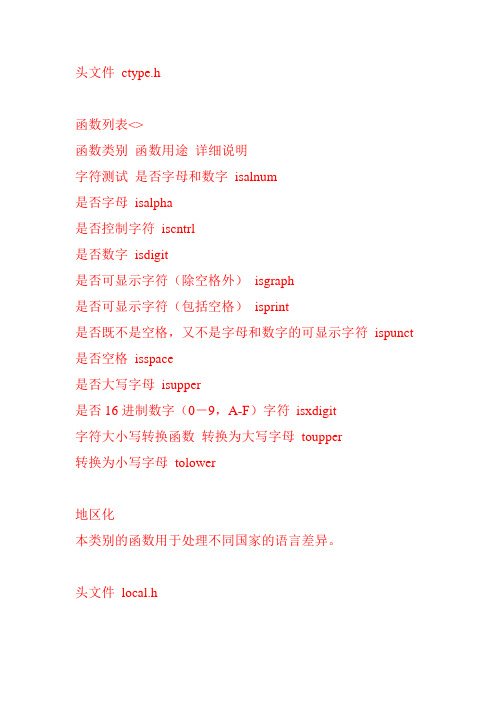
头文件ctype.h函数列表<>函数类别函数用途详细说明字符测试是否字母和数字isalnum是否字母isalpha是否控制字符iscntrl是否数字isdigit是否可显示字符(除空格外)isgraph是否可显示字符(包括空格)isprint是否既不是空格,又不是字母和数字的可显示字符ispunct 是否空格isspace是否大写字母isupper是否16进制数字(0-9,A-F)字符isxdigit字符大小写转换函数转换为大写字母toupper转换为小写字母tolower地区化本类别的函数用于处理不同国家的语言差异。
头文件local.h函数列表函数类别函数用途详细说明地区控制地区设置setlocale数字格式约定查询国家的货币、日期、时间等的格式转换localeconv数学函数本分类给出了各种数学计算函数,必须提醒的是ANSI C标准中的数据格式并不符合IEEE754标准,一些C语言编译器却遵循IEEE754(例如frinklin C51)头文件math.h函数列表函数类别函数用途详细说明错误条件处理定义域错误(函数的输入参数值不在规定的范围内)值域错误(函数的返回值不在规定的范围内)三角函数反余弦acos反正弦asin反正切atan反正切2 atan2余弦cos正弦sin正切tan双曲函数双曲余弦cosh双曲正弦sinh双曲正切tanh指数和对数指数函数exp指数分解函数frexp乘积指数函数fdexp自然对数log以10为底的对数log10浮点数分解函数modf幂函数幂函数pow平方根函数sqrt整数截断,绝对值和求余数函数求下限接近整数ceil绝对值fabs求上限接近整数floor求余数fmod本分类函数用于实现在不同底函数之间直接跳转代码。
头文件setjmp.h io.h函数列表函数类别函数用途详细说明保存调用环境setjmp恢复调用环境longjmp信号处理该分类函数用于处理那些在程序执行过程中发生例外的情况。
c语言开头格式

C语言的开头格式通常包括头文件和main函数,具体如下:
1. 头文件:#include <stdio.h>
这是一个预处理指令,它指示编译器在编译过程中引入标准输入输出库(stdio.h),以便后续的程序可以使用标准输入输出函数,例如printf()和scanf()等。
2. main函数:int main()
这是C语言程序的入口函数,程序将从这里开始执行。
main函数必须返回一个整数值,通常情况下,返回值为0表示程序正常结束,非0值则表示程序异常结束。
在main函数中可以编写程序代码,完成特定的任务。
例如,可以编写代码来计算两个数的和、输出一段文本、读取用户输入等等。
C语言常用头文件
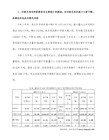
头文件 time.h
日期和时间函数: 本类别给出时间和日期处理函数
----------------------------------------
时间操作函数得到处理器时间 clock
得到时间差 difftime
设置时间 mktime
1 错误处理 errno.h
2 字符处理 ctype.h
3 地区化 local.h
4 数学函数 math.h
5 信号处理 signal.h
6 输入输出 stdio.h
7 实用工具程序 stdlib.h
8 字符串处理 string.h
C标准中的数据格式并不符合IEEE754标准,一些C语言编译器却遵循IEEE754(例如frinklin C51)
----------------------------------------
反余弦 acos
反正弦 asin
反正切 atan
错误处理函数
错误清除 clearerr
文件结尾判断 feof
文件错误检测 ferror
得到错误提示字符串 perror
头文件 stdlib.h
实用工具函数: 本分类给出了一些函数无法按以上分类,但又是编程所必须要的。
自然对数 log
以10为底的对数 log10
浮点数分解函数 modf
幂函数 pow
平方根函数 sqrt
求下限接近整数 ceil
绝对值 fabs
求上限接近整数 floor
求余数 fmod
头文件 setjmp.h io.h
本分类函数用于实现在不同底函数之间直接跳转代码。
C语言文件操作的头文件

C语⾔⽂件操作的头⽂件计算机⽂件是以计算机硬盘为载体存储在计算机上的信息集合,是存储在某种长期储存设备上的⼀段数据流。
在C语⾔中⽤⼀个指针变量指向⼀个⽂件,这个指针称为⽂件指针。
通过⽂件指针就可对它所指的⽂件进⾏各种操作,C语⾔规定该⽂件指针类型为FILE型。
⽂件的信息有这个FILE型的结构体来进⾏定义。
FILE的结构体的定义如下例如我们定义⼀个⽂件指针:FILE *fp; fp指向某⼀个⽂件的⽂件信息区(是⼀个结构体变量),通过该⽂件信息区就能够访问该⽂件。
如下图所⽰:⽂件缓冲区:缓冲⽂件系统是指系统⾃动地在内存区为程序中每⼀个正在使⽤的⽂件开辟⼀个⽂件缓冲区。
从内存向磁盘输出数据必须先送到内存中的缓冲区,装满缓冲区后才⼀起送到磁盘中去。
⽂件的打开(fopen函数)函数调⽤:FILE *fp;fp = fopen(⽂件名,使⽤⽂件⽅式);typedef struct{short level; // 缓冲区“满”或“空”的程度unsigned flags; // ⽂件状态标志char fd; // ⽂件描述符unsigned char hold; // 如缓冲区⽆内容不读取字符short bsize; // 缓冲区的⼤⼩unsigned char *buffer; // 数据缓冲区的位置unsigned ar *curp; // 指针当前的指向unsigned istemp; // 临时⽂件指⽰器short token; // ⽤于有效性检查}FILE;注意:需要打开的⽂件名,也就是准备访问的⽂件的名字使⽤⽂件的⽅式(“读”还是“写”等);让哪⼀个指针变量指向被打开的⽂件。
⽂件使⽤⽅式 含 义-------------------------------------------------------------------------------------“r” (只读)为输⼊打开⼀个⽂本⽂件“w” (只写)为输出打开⼀个⽂本⽂件“a” (追加)向⽂本⽂件尾增加数据(以ascll码的形式追加)“rb” (只读)为输⼊打开⼀个⼆进制⽂件“wb” (只写)为输出打开⼀个⼆进制⽂件"ab“ (追加)向⼆进制⽂件尾增加数据(以⼆进制的形式追加)"r+“ (读写)为读/写打开⼀个⽂本⽂件"w+” (读写)为读/写建⽴⼀个新的⽂本⽂件"a+” (读写)为读/写打开⼀个⽂本⽂件"rb+“ (读写)为读/写打开⼀个⼆进制⽂件“wb+“ (读写)为读/写建⽴⼀个新的⼆进制⽂件“ab+” (读写)为读/写打开⼀个⼆进制⽂件-------------------------------------------------------------------------------------⼏点注意:凡⽤“r”打开⼀个⽂件时,该⽂件必须已经存在,且只能从该⽂件读出。
C语言里面关于字符数组的函数定义的头文件
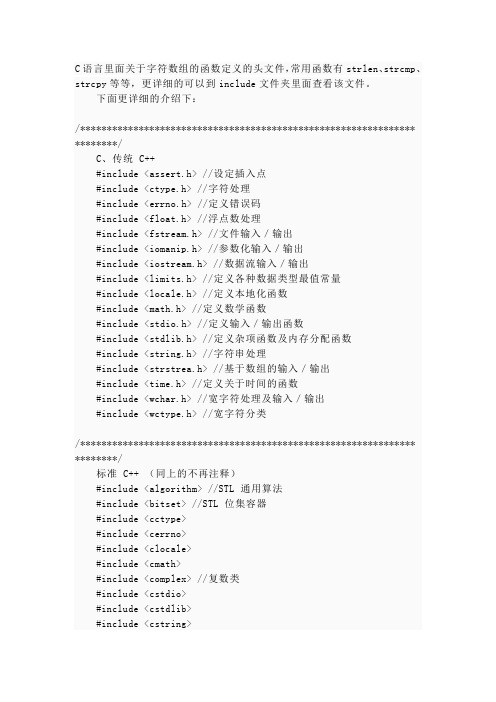
C语言里面关于字符数组的函数定义的头文件,常用函数有strlen、strcmp、strcpy等等,更详细的可以到include文件夹里面查看该文件。
下面更详细的介绍下:/*************************************************************** ********/C、传统 C++#include <assert.h> //设定插入点#include <ctype.h> //字符处理#include <errno.h> //定义错误码#include <float.h> //浮点数处理#include <fstream.h> //文件输入/输出#include <iomanip.h> //参数化输入/输出#include <iostream.h> //数据流输入/输出#include <limits.h> //定义各种数据类型最值常量#include <locale.h> //定义本地化函数#include <math.h> //定义数学函数#include <stdio.h> //定义输入/输出函数#include <stdlib.h> //定义杂项函数及内存分配函数#include <string.h> //字符串处理#include <strstrea.h> //基于数组的输入/输出#include <time.h> //定义关于时间的函数#include <wchar.h> //宽字符处理及输入/输出#include <wctype.h> //宽字符分类/*************************************************************** ********/标准 C++ (同上的不再注释)#include <algorithm> //STL 通用算法#include <bitset> //STL 位集容器#include <cctype>#include <cerrno>#include <clocale>#include <cmath>#include <complex> //复数类#include <cstdio>#include <cstdlib>#include <cstring>#include <ctime>#include <deque> //STL 双端队列容器#include <exception> //异常处理类#include <fstream>#include <functional> //STL 定义运算函数(代替运算符)#include <limits>#include <list> //STL 线性列表容器#include <map> //STL 映射容器#include <iomanip>#include <ios> //基本输入/输出支持#include <iosfwd> //输入/输出系统使用的前置声明#include <iostream>#include <istream> //基本输入流#include <ostream> //基本输出流#include <queue> //STL 队列容器#include <set> //STL 集合容器#include <sstream> //基于字符串的流#include <stack> //STL 堆栈容器#include <stdexcept> //标准异常类#include <streambuf> //底层输入/输出支持#include <string> //字符串类#include <utility> //STL 通用模板类#include <vector> //STL 动态数组容器#include <cwchar>#include <cwctype>using namespace std;/*************************************************************** ********/C99 增加#include <complex.h> //复数处理#include <fenv.h> //浮点环境#include <inttypes.h> //整数格式转换#include <stdbool.h> //布尔环境#include <stdint.h> //整型环境#include <tgmath.h> //通用类型数学宏/*************************************************************** ********/。
C语言头文件大全
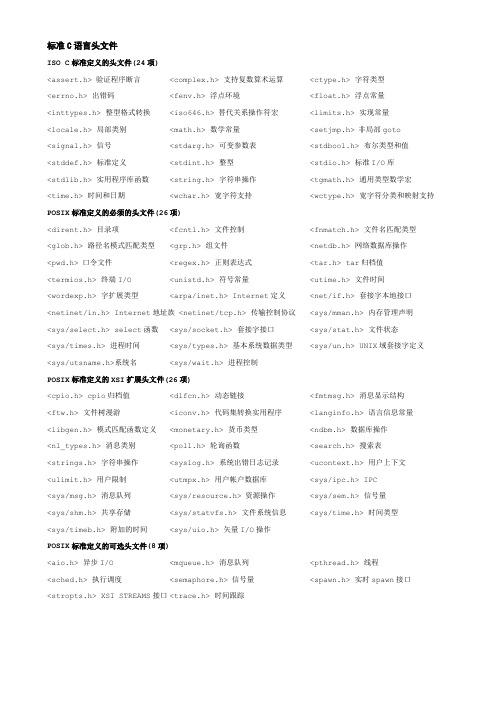
标准C语言头文件ISO C标准定义的头文件(24项)<assert.h> 验证程序断言<complex.h> 支持复数算术运算<ctype.h> 字符类型<errno.h> 出错码<fenv.h> 浮点环境<float.h> 浮点常量<inttypes.h> 整型格式转换<iso646.h> 替代关系操作符宏<limits.h> 实现常量<locale.h> 局部类别<math.h> 数学常量<setjmp.h> 非局部goto<signal.h> 信号<stdarg.h> 可变参数表<stdbool.h> 布尔类型和值<stddef.h> 标准定义<stdint.h> 整型<stdio.h> 标准I/O库<stdlib.h> 实用程序库函数<string.h> 字符串操作<tgmath.h> 通用类型数学宏<time.h> 时间和日期<wchar.h> 宽字符支持<wctype.h> 宽字符分类和映射支持POSIX标准定义的必须的头文件(26项)<dirent.h> 目录项<fcntl.h> 文件控制<fnmatch.h> 文件名匹配类型<glob.h> 路径名模式匹配类型<grp.h> 组文件<netdb.h> 网络数据库操作<pwd.h> 口令文件<regex.h> 正则表达式<tar.h> tar归档值<termios.h> 终端I/O <unistd.h> 符号常量<utime.h> 文件时间<wordexp.h> 字扩展类型<arpa/inet.h> Internet定义<net/if.h> 套接字本地接口<netinet/in.h> Internet地址族 <netinet/tcp.h> 传输控制协议<sys/mman.h> 内存管理声明<sys/select.h> select函数<sys/socket.h> 套接字接口<sys/stat.h> 文件状态<sys/times.h> 进程时间<sys/types.h> 基本系统数据类型<sys/un.h> UNIX域套接字定义<sys/utsname.h>系统名<sys/wait.h> 进程控制POSIX标准定义的XSI扩展头文件(26项)<cpio.h> cpio归档值<dlfcn.h> 动态链接<fmtmsg.h> 消息显示结构<ftw.h> 文件树漫游<iconv.h> 代码集转换实用程序<langinfo.h> 语言信息常量<libgen.h> 模式匹配函数定义<monetary.h> 货币类型<ndbm.h> 数据库操作<nl_types.h> 消息类别<poll.h> 轮询函数<search.h> 搜索表<strings.h> 字符串操作<syslog.h> 系统出错日志记录<ucontext.h> 用户上下文<ulimit.h> 用户限制<utmpx.h> 用户帐户数据库<sys/ipc.h> IPC<sys/msg.h> 消息队列<sys/resource.h> 资源操作<sys/sem.h> 信号量<sys/shm.h> 共享存储<sys/statvfs.h> 文件系统信息<sys/time.h> 时间类型<sys/timeb.h> 附加的时间<sys/uio.h> 矢量I/O操作POSIX标准定义的可选头文件(8项)<aio.h> 异步I/O <mqueue.h> 消息队列<pthread.h> 线程<sched.h> 执行调度<semaphore.h> 信号量<spawn.h> 实时spawn接口<stropts.h> XSI STREAMS接口<trace.h> 时间跟踪标准 C++ 语言头文件(54个其中16个用于构建STL,3个为附加非必须)<algorithm>STL通用算法<bitset> STL位集容器<cassert> 用于在程序运行时执行断言<cctype> 字符处理<cerrno> 错误码<cfloat> 用于测试浮点类型属性<ciso646> ISO646变体字符集<climits> 测试整数类型属性<clocale> 本地化函数<cmath> 数学函数<complex>复数类<csetjmp> 执行非内部的goto语句<csignal> 信号<cstdarg> 访问参数数量变化的函数<cstddef> 用于定义实用的类型和宏<cstdio> 输入/输出<cstdlib> 杂项函数及内存分配<cstring> 字符串<ctime> 时间<cwchar> 宽字符处理及输入/输出<cwctype> 宽字符分类<deque> STL双端队列容器<exception> 异常处理类<fstream> 文件流<functional> STL函数对象<iomanip> 参数化输入/输出<ios>基本输入/输出支持<iosfwd> 输入/输出前置声明<iostream> 数据流输入/输出<istream> 基本输入流<iterator> 遍历序列的类<limits> 各种数据类型最值常量<list>STL线性列表容器<locale> 国际化支持<map> STL映射容器<memory> 专用内存分配器<new> 基本内存分配和释放<numeric> 通用的数字操作<ostream> 基本输出流<queue> STL 队列容器<set> STL 集合容器<sstream> 基于字符串的流<stack> STL 堆栈容器<stdexcept> 标准异常类<streambuf> iostream 的缓冲区类<string> 字符串类<strstream> 非内存字符序列的流类<typeinfo> 运行时类型标识<utility> STL 通用模板类<valarray> 支持值数组的类和模版类<vector> STL 动态数组容器标准C++附加的头文件(3个)非必须<hash_map> <hash_set> <slist>The Standard C++ library consists of 51 required headers.This implementation also includes three additional headers,<hash_map>,<hash_set>,and <slist>,not required by the C++ Standard,for a total of 54 headers.Of these 54 headers,16 constitute the Standard Template Library,or STL.These are indicated below with the notation<algorithm> -- (STL) for defining numerous templates that implement useful algorithms<bitset> -- for defining a template class that administers sets of bits<complex> -- for defining a template class that supports complex arithmetic<deque> -- (STL) for defining a template class that implements a deque container<exception> -- for defining several functions that control exception handling<fstream> -- for defining several iostreams template classes that manipulate exteral files<functional>-- (STL) for defining several templates that help construct predicates for the templates defined in <algorithm> and <numeric><hash_map> -- (STL) for defining template classes that implement hashed associative containersthat map keys to values<hash_set> -- (STL) for defining template classes that implement hashed associative containers<iomanip> -- for declaring several iostreams manipulators that take an argument<ios> -- for defining the template class that serves as the base for many iostreams classes<iosfwd> -- for declaring several iostreams template classes before they are necessarilydefined<iostream> -- for declaring the iostreams objects that manipulate the standard streams<istream> -- for defining the template class that performs extractions<iterator> -- (STL) for defining several templates that help define and manipulate iterators<limits> -- for testing numeric type properties<list>-- (STL) for defining a template class that implements a doubly linked list container<locale> -- for defining several classes and templates that controllocale-specific behavior, as in the iostreams classes<map>-- (STL) for defining template classes that implement associative containers thatmap keys to values<memory>-- (STL) for defining several templates that allocate and free storage for variouscontainer classes<new> -- for declaring several functions that allocate and free storage<numeric>-- (STL) for defining several templates that implement useful numeric functions<ostream> -- for defining the template class that performs insertions<queue> -- (STL) for defining a template class that implements a queue container<set>-- (STL) for defining template classes that implement associative containers<slist>-- (STL) for defining a template class that implements a singly linked list container<sstream> -- for defining several iostreams template classes that manipulate string containers<stack> -- (STL) for defining a template class that implements a stack container<stdexcept> -- for defining several classes useful for reporting exceptions<streambuf> -- for defining template classes that buffer iostreams operations<string> -- for defining a template class that implements a string container<strstream> -- for defining several iostreams classes that manipulate in-memory character sequences<typeinfo> -- for defining class type_info, the result of the typeid operator<utility>-- (STL) for defining several templates of general utility<valarray> -- for defining several classes and template classes that support value-oriented arrays<vector>-- (STL) for defining a template class that implements a vector container新的C标准库<cassert> -- for enforcing assertions when functions execute<cctype> -- for classifying characters<cerrno> -- for testing error codes reported by library functions<cfloat> -- for testing floating-point type properties<ciso646> -- for programming in ISO 646 variant character sets<climits> -- for testing integer type properties<clocale> -- for adapting to different cultural conventions<cmath> -- for computing common mathematical functions<csetjmp> -- for executing nonlocal goto statements<csignal> -- for controlling various exceptional conditions<cstdarg> -- for accessing a varying number of arguments<cstddef> -- for defining several useful types and macros<cstdio> -- for performing input and output<cstdlib> -- for performing a variety of operations<cstring> -- for manipulating several kinds of strings<ctime> -- for converting between various time and date formats<cwchar> -- for manipulating wide streams and several kinds of strings<cwctype> -- for classifying wide characters旧的C标准库<assert.h> -- for enforcing assertions when functions execute<ctype.h> -- for classifying characters<errno.h> -- for testing error codes reported by library functions<float.h> -- for testing floating-point type properties<iso646.h> -- for programming in ISO 646 variant character sets<limits.h> -- for testing integer type properties<locale.h> -- for adapting to different cultural conventions<math.h> -- for computing common mathematical functions<setjmp.h> -- for executing nonlocal goto statements<signal.h> -- for controlling various exceptional conditions<stdarg.h> -- for accessing a varying number of arguments<stddef.h> -- for defining several useful types and macros<stdio.h> -- for performing input and output<stdlib.h> -- for performing a variety of operations<string.h> -- for manipulating several kinds of strings<time.h> -- for converting between various time and date formats<wchar.h> -- for manipulating wide streams and several kinds of strings<wctype.h> -- for classifying wide charactersFinally, in this implementation, the Standard C++ library also includes several headers for compatibility with traditional C++ libraries:<fstream.h> -- for defining several iostreams template classes that manipulate exteral files <iomanip.h> -- for declaring several iostreams manipulators that take an argument<iostream.h> -- for declaring the iostreams objects that manipulate the standard streams <new.h> -- for declaring several functions that allocate and free storage<stl.h> -- for declaring several template classes that aid migration from older versions of the Standard Template Library。
C,C++各种头文件名称
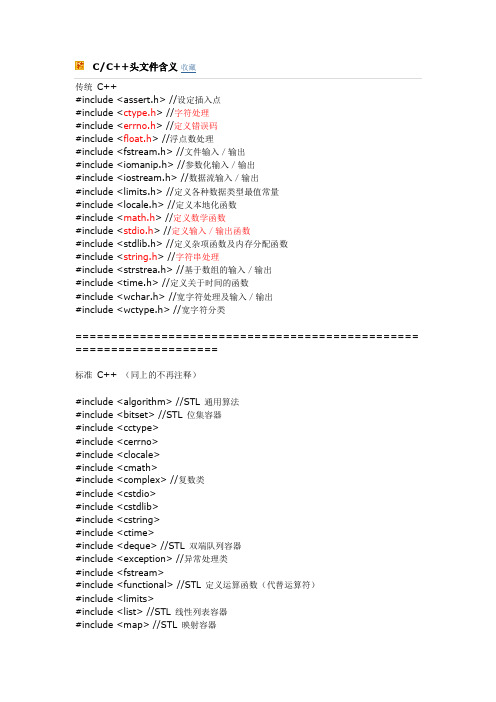
C/C++头文件含义收藏传统C++#include <assert.h> //设定插入点#include <ctype.h> //字符处理#include <errno.h> //定义错误码#include <float.h> //浮点数处理#include <fstream.h> //文件输入/输出#include <iomanip.h> //参数化输入/输出#include <iostream.h> //数据流输入/输出#include <limits.h> //定义各种数据类型最值常量#include <locale.h> //定义本地化函数#include <math.h> //定义数学函数#include <stdio.h> //定义输入/输出函数#include <stdlib.h> //定义杂项函数及内存分配函数#include <string.h> //字符串处理#include <strstrea.h> //基于数组的输入/输出#include <time.h> //定义关于时间的函数#include <wchar.h> //宽字符处理及输入/输出#include <wctype.h> //宽字符分类================================================ ====================标准C++ (同上的不再注释)#include <algorithm> //STL 通用算法#include <bitset> //STL 位集容器#include <cctype>#include <cerrno>#include <clocale>#include <cmath>#include <complex> //复数类#include <cstdio>#include <cstdlib>#include <cstring>#include <ctime>#include <deque> //STL 双端队列容器#include <exception> //异常处理类#include <fstream>#include <functional> //STL 定义运算函数(代替运算符)#include <limits>#include <list> //STL 线性列表容器#include <map> //STL 映射容器#include <iomanip>#include <ios> //基本输入/输出支持#include <iosfwd> //输入/输出系统使用的前置声明#include <iostream>#include <istream> //基本输入流#include <ostream> //基本输出流#include <queue> //STL 队列容器#include <set> //STL 集合容器#include <sstream> //基于字符串的流#include <stack> //STL 堆栈容器#include <stdexcept> //标准异常类#include <streambuf> //底层输入/输出支持#include <string> //字符串类#include <utility> //STL 通用模板类#include <vector> //STL 动态数组容器#include <cwchar>#include <cwctype>using namespace std;ZT baidu Q&AQ:vc2005中,同时有#include<stdio.h> #include<cstdio> ,然后调用printf,为什么不报错呢#include<stdio.h> #include<cstdio>应该是向程序中引入了两个不同的库,这两个不同的库都有printf,编译器应该不知道调用哪个printf的,应该报错的,为什么没有报错呢。
C语言头文件大全
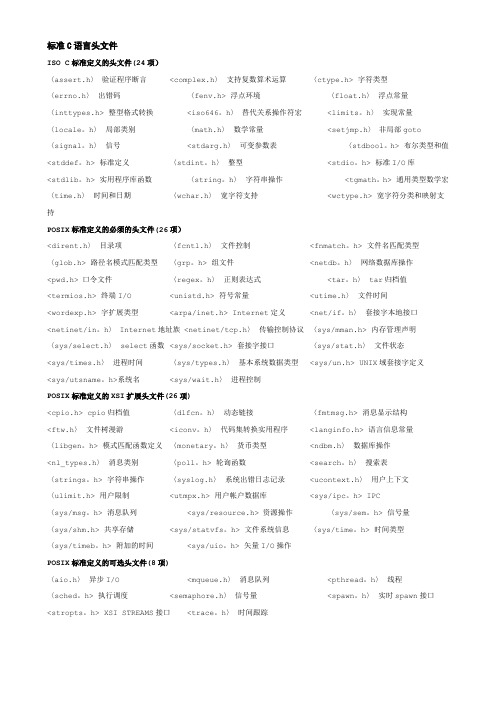
标准C语言头文件ISO C标准定义的头文件(24项)〈assert.h〉验证程序断言<complex.h〉支持复数算术运算〈ctype.h> 字符类型〈errno.h〉出错码〈fenv.h> 浮点环境〈float.h〉浮点常量〈inttypes.h> 整型格式转换<iso646。
h〉替代关系操作符宏<limits。
h〉实现常量〈locale。
h〉局部类别〈math.h〉数学常量<setjmp.h〉非局部goto 〈signal。
h〉信号<stdarg.h〉可变参数表〈stdbool。
h> 布尔类型和值<stddef。
h> 标准定义〈stdint。
h〉整型<stdio。
h> 标准I/O库<stdlib。
h> 实用程序库函数〈string。
h〉字符串操作<tgmath。
h> 通用类型数学宏〈time.h〉时间和日期〈wchar.h〉宽字符支持<wctype.h> 宽字符分类和映射支持POSIX标准定义的必须的头文件(26项)<dirent.h〉目录项〈fcntl.h〉文件控制<fnmatch。
h> 文件名匹配类型〈glob.h> 路径名模式匹配类型〈grp。
h> 组文件<netdb。
h〉网络数据库操作<pwd.h> 口令文件〈regex。
h〉正则表达式<tar。
h〉 tar归档值<termios.h> 终端I/O <unistd.h> 符号常量<utime.h〉文件时间<wordexp.h> 字扩展类型<arpa/inet.h> Internet定义<net/if。
h〉套接字本地接口<netinet/in。
h〉 Internet地址族 <netinet/tcp.h〉传输控制协议〈sys/mman.h> 内存管理声明〈sys/select.h〉 select函数<sys/socket.h> 套接字接口〈sys/stat.h〉文件状态<sys/times.h〉进程时间〈sys/types.h〉基本系统数据类型<sys/un.h> UNIX域套接字定义<sys/utsname。
C语言头文件大全
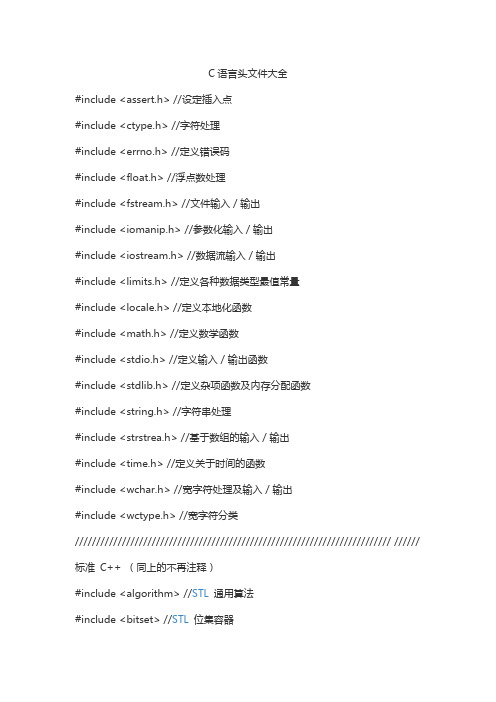
C语言头文件大全#include <assert.h> //设定插入点#include <ctype.h> //字符处理#include <errno.h> //定义错误码#include <float.h> //浮点数处理#include <fstream.h> //文件输入/输出#include <iomanip.h> //参数化输入/输出#include <iostream.h> //数据流输入/输出#include <limits.h> //定义各种数据类型最值常量#include <locale.h> //定义本地化函数#include <math.h> //定义数学函数#include <stdio.h> //定义输入/输出函数#include <stdlib.h> //定义杂项函数及内存分配函数#include <string.h> //字符串处理#include <strstrea.h> //基于数组的输入/输出#include <time.h> //定义关于时间的函数#include <wchar.h> //宽字符处理及输入/输出#include <wctype.h> //宽字符分类////////////////////////////////////////////////////////////////////////// ////// 标准C++ (同上的不再注释)#include <algorithm> //STL通用算法#include <bitset> //STL位集容器#include <cctype>#include <cerrno>#include <clocale>#include <cmath>#include <complex> //复数类#include <cstdio>#include <cstdlib>#include <cstring>#include <ctime>#include <deque> //STL双端队列容器#include <exception> //异常处理类#include <fstream>#include <functional> //STL 定义运算函数(代替运算符)#include <limits>#include <list> //STL 线性列表容器#include <map> //STL 映射容器#include <iomanip>#include <ios> //基本输入/输出支持#include <iosfwd> //输入/输出系统使用的前置声明#include <iostream>#include <istream> //基本输入流#include <ostream> //基本输出流#include <queue> //STL 队列容器#include <set> //STL 集合容器#include <sstream> //基于字符串的流#include <stack> //STL 堆栈容器#include <stdexcept> //标准异常类#include <streambuf> //底层输入/输出支持#include <string> //字符串类#include <utility> //STL 通用模板类#include <vector> //STL 动态数组容器#include <cwchar>#include <cwctype>////////////////////////////////////////////////////////////////////////// ////// #include <complex.h> //复数处理#include <fenv.h> //浮点环境#include <inttypes.h> //整数格式转换#include <stdbool.h> //布尔环境#include <stdint.h> //整型环境#include <tgmath.h> //通用类型数学宏#include<conio.h> //说明调用DOS控制台I/O子程序的各个函数。
C语言头文件使用大全
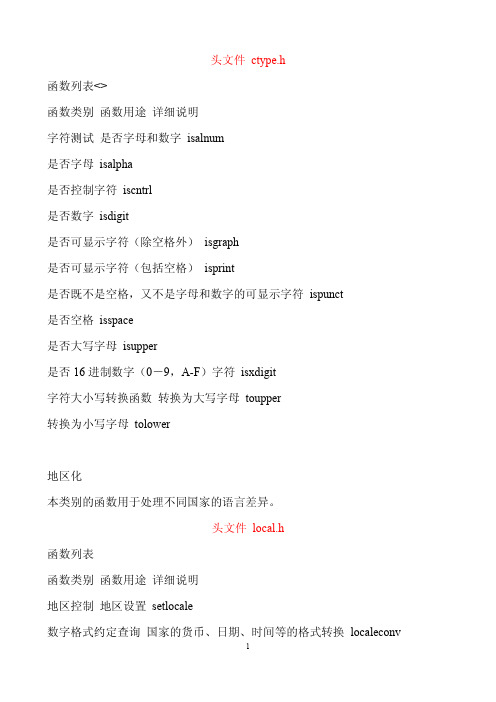
字符输入(控制台) getchar 字符串输入(控制台) gets 字符输出(控制台) putc 字符输出(控制台) putchar 字符串输出(控制台) puts 字符输出到流的头部 ungetc 直接输入输出 直接流读操作 fread 直接流写操作 fwrite 文件定位函数 得到文件位置 fgetpos 文件位置移动 fseek 文件位置设置 fsetpos 得到文件位置 ftell 文件位置复零位 remind 错误处理函数 错误清除 clearerr 文件结尾判断 feof 文件错误检测 ferror 得到错误提示字符串 perror
#include <assert.h> //设定插入点 #include <ctype.h> //字符处理 #include <errno.h> //定义错误码 #include <float.h> //浮点数处理 #include <fstream.h> //文件输入/输出 #include <iomanip.h> //参数化输入/输出 #include <iostream.h> //数据流输入/输出 #include <limits.h> //定义各种数据类型最值常量
日期和时间函数 本类别给出时间和日期处理函数
头文件 time.h 函数列表 函数类别 函数用途 详细说明 时间操作函数 得到处理器时间 clock 得到时间差 difftime 设置时间 mktime 得到时间 time 时间转换函数 得到以 ASCII 码表示的时间 asctime
9
得到字符串表示的时间 ctime 得到指定格式的时间 strftime
头文件 stdarg.h 函数列表 函数类别 函数用途 详细说明 可变参数访问宏 可变参数开始宏 va_start 可变参数结束宏 va_end 可变参数访问宏 访问下一个可变参数宏 va_arg
【CC++】程序设计语言之常用头文件及函数汇总
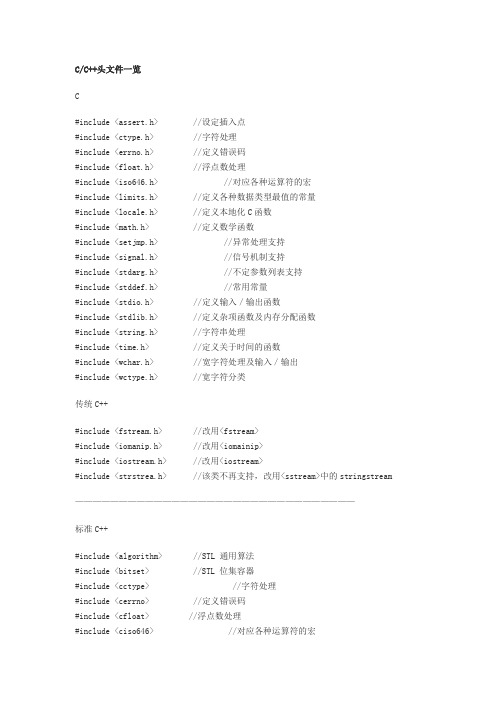
C/C++头文件一览C#include <assert.h> //设定插入点#include <ctype.h> //字符处理#include <errno.h> //定义错误码#include <float.h> //浮点数处理#include <iso646.h> //对应各种运算符的宏#include <limits.h> //定义各种数据类型最值的常量#include <locale.h> //定义本地化C函数#include <math.h> //定义数学函数#include <setjmp.h> //异常处理支持#include <signal.h> //信号机制支持#include <stdarg.h> //不定参数列表支持#include <stddef.h> //常用常量#include <stdio.h> //定义输入/输出函数#include <stdlib.h> //定义杂项函数及内存分配函数#include <string.h> //字符串处理#include <time.h> //定义关于时间的函数#include <wchar.h> //宽字符处理及输入/输出#include <wctype.h> //宽字符分类传统C++#include <fstream.h> //改用<fstream>#include <iomanip.h> //改用<iomainip>#include <iostream.h> //改用<iostream>#include <strstrea.h> //该类不再支持,改用<sstream>中的stringstream ————————————————————————————————标准C++#include <algorithm> //STL 通用算法#include <bitset> //STL 位集容器#include <cctype> //字符处理#include <cerrno> //定义错误码#include <cfloat> //浮点数处理#include <ciso646> //对应各种运算符的宏#include <climits> //定义各种数据类型最值的常量#include <clocale> //定义本地化函数#include <cmath> //定义数学函数#include <complex> //复数类#include <csignal> //信号机制支持#include <csetjmp> //异常处理支持#include <cstdarg> //不定参数列表支持#include <cstddef> //常用常量#include <cstdio> //定义输入/输出函数#include <cstdlib> //定义杂项函数及内存分配函数#include <cstring> //字符串处理#include <ctime> //定义关于时间的函数#include <cwchar> //宽字符处理及输入/输出#include <cwctype> //宽字符分类#include <deque> //STL 双端队列容器#include <exception> //异常处理类#include <fstream> //文件输入/输出#include <functional> //STL 定义运算函数(代替运算符)#include <limits> //定义各种数据类型最值常量#include <list> //STL 线性列表容器#include <locale> //本地化特定信息#include <map> //STL 映射容器#include <memory> //STL通过分配器进行的内存分配#include <new> //动态内存分配#include <numeric> //STL常用的数字操作#include <iomanip> //参数化输入/输出#include <ios> //基本输入/输出支持#include <iosfwd> //输入/输出系统使用的前置声明#include <iostream> //数据流输入/输出#include <istream> //基本输入流#include <iterator> //STL迭代器#include <ostream> //基本输出流#include <queue> //STL 队列容器#include <set> //STL 集合容器#include <sstream> //基于字符串的流#include <stack> //STL 堆栈容器#include <stdexcept> //标准异常类#include <streambuf> //底层输入/输出支持#include <string> //字符串类#include <typeinfo> //运行期间类型信息#include <utility> //STL 通用模板类#include <valarray> //对包含值的数组的操作#include <vector> //STL 动态数组容器————————————————————————————————C99增加的部分#include <complex.h> //复数处理#include <fenv.h> //浮点环境#include <inttypes.h> //整数格式转换#include <stdbool.h> //布尔环境#include <stdint.h> //整型环境#include <tgmath.h> //通用类型数学宏头文件 ctype.h字符处理函数: 本类别函数用于对单个字符进行处理,包括字符的类别测试和字符的大小写转换----------------------------------------字符测试是否字母和数字 isalnum是否字母 isalpha是否控制字符 iscntrl是否数字 isdigit是否可显示字符(除空格外) isgraph是否可显示字符(包括空格) isprint是否既不是空格,又不是字母和数字的可显示字符 ispunct是否空格 isspace是否大写字母 isupper是否16进制数字(0-9,A-F)字符 isxdigit字符大小写转换函数转换为大写字母 toupper转换为小写字母 tolower头文件 local.h地区化: 本类别的函数用于处理不同国家的语言差异。
C语言常用的库文件(头文件、函数库)

C语⾔常⽤的库⽂件(头⽂件、函数库)C语⾔常⽤的库⽂件(头⽂件、函数库) C系统提供了丰富的系统⽂件,称为库⽂件。
C的库⽂件分为两类,⼀类是扩展名为".h"的⽂件,称为头⽂件,在前⾯的包含命令中我们已多次使⽤过。
在".h"⽂件中包含了常量定义、类型定义、宏定义、函数原型以及各种编译选择设置等信息。
另⼀类是函数库,包括了各种函数的⽬标代码,供⽤户在程序中调⽤。
通常在程序中调⽤⼀个库函数时,要在调⽤之前包含该函数原型所在的".h" ⽂件。
下⾯给出Turbo C的全部".h"⽂件。
Turbo C头⽂件:头⽂件说明alloc.h说明内存管理函数(分配、释放等)。
assert.h定义 assert调试宏。
bios.h说明调⽤IBM—PC ROM BIOS⼦程序的各个函数。
conio.h说明调⽤DOS控制台I/O⼦程序的各个函数。
ctype.h包含有关字符分类及转换的名类信息(如 isalpha和toascii等)。
dir.h包含有关⽬录和路径的结构、宏定义和函数。
dos.h定义和说明MSDOS和8086调⽤的⼀些常量和函数。
error.h定义错误代码的助记符。
fcntl.h定义在与open库⼦程序连接时的符号常量。
float.h包含有关浮点运算的⼀些参数和函数。
graphics.h说明有关图形功能的各个函数,图形错误代码的常量定义,正对不同驱动程序的各种颜⾊值,及函数⽤到的⼀些特殊结构。
io.h包含低级I/O⼦程序的结构和说明。
limit.h包含各环境参数、编译时间限制、数的范围等信息。
math.h说明数学运算函数,还定了 HUGE VAL 宏,说明了matherr和matherr⼦程序⽤到的特殊结构。
mem.h说明⼀些内存操作函数(其中⼤多数也在STRING.H中说明)。
process.h说明进程管理的各个函数,spawn…和EXEC …函数的结构说明。
C语言头文件#includestdlib.h的作用
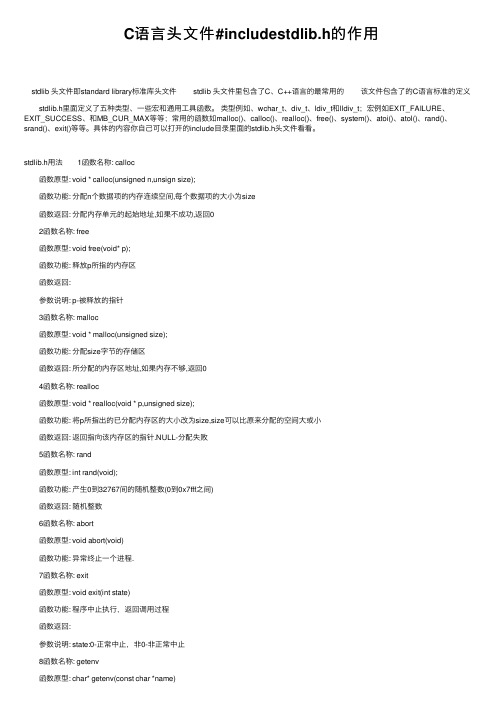
C语⾔头⽂件#includestdlib.h的作⽤ stdlib 头⽂件即standard library标准库头⽂件 stdlib 头⽂件⾥包含了C、C++语⾔的最常⽤的 该⽂件包含了的C语⾔标准的定义 stdlib.h⾥⾯定义了五种类型、⼀些宏和通⽤⼯具函数。
类型例如、wchar_t、div_t、ldiv_t和lldiv_t;宏例如EXIT_FAILURE、EXIT_SUCCESS、和MB_CUR_MAX等等;常⽤的函数如malloc()、calloc()、realloc()、free()、system()、atoi()、atol()、rand()、srand()、exit()等等。
具体的内容你⾃⼰可以打开的include⽬录⾥⾯的stdlib.h头⽂件看看。
stdlib.h⽤法 1函数名称: calloc 函数原型: void * calloc(unsigned n,unsign size); 函数功能: 分配n个数据项的内存连续空间,每个数据项的⼤⼩为size 函数返回: 分配内存单元的起始地址,如果不成功,返回0 2函数名称: free 函数原型: void free(void* p); 函数功能: 释放p所指的内存区 函数返回: 参数说明: p-被释放的指针 3函数名称: malloc 函数原型: void * malloc(unsigned size); 函数功能: 分配size字节的存储区 函数返回: 所分配的内存区地址,如果内存不够,返回0 4函数名称: realloc 函数原型: void * realloc(void * p,unsigned size); 函数功能: 将p所指出的已分配内存区的⼤⼩改为size,size可以⽐原来分配的空间⼤或⼩ 函数返回: 返回指向该内存区的指针.NULL-分配失败 5函数名称: rand 函数原型: int rand(void); 函数功能: 产⽣0到32767间的随机整数(0到0x7fff之间) 函数返回: 随机整数 6函数名称: abort 函数原型: void abort(void) 函数功能: 异常终⽌⼀个进程. 7函数名称: exit 函数原型: void exit(int state) 函数功能: 程序中⽌执⾏,返回调⽤过程 函数返回: 参数说明: state:0-正常中⽌,⾮0-⾮正常中⽌ 8函数名称: getenv 函数原型: char* getenv(const char *name) 函数功能: 返回⼀个指向环境变量的指针 函数返回: 环境变量的定义 参数说明: name-环境字符串 9函数名称: putenv 函数原型: int putenv(const char *name) 函数功能: 将字符串name增加到DOS环境变量中 函数返回: 0:操作成功,-1:操作失败 参数说明: name-环境字符串 10函数名称: labs 函数原型: long labs(long num) 函数功能: 求长整型参数的 函数返回: 绝对值 11函数名称: atof 函数原型: double atof(char *str) 函数功能: 将字符串转换成⼀个双精度数值 函数返回: 转换后的数值 参数说明: str-待转换浮点型数的字符串 12函数名称: atoi 函数原型: int atoi(char *str) 函数功能: 将字符串转换成⼀个整数值 函数返回: 转换后的数值 参数说明: str-待转换为整型数的字符串 13函数名称: atol 函数原型: long atol(char *str) 函数功能: 将字符串转换成⼀个长整数 函数返回: 转换后的数值 参数说明: str-待转换为长整型的字符串 14函数名称: ecvt 函数原型: char *ecvt(double value,int ndigit,int *dec,int *sign) 函数功能: 将浮点数转换为字符串 函数返回: 转换后的字符串指针 参数说明: value-待转换底浮点数,ndigit-转换后的字符串长度 15函数名称: fcvt 函数原型: char *fcvt(double value,int ndigit,int *dec,int *sign) 函数功能: 将浮点数变成⼀个字符串 函数返回: 转换后字符串指针 参数说明: value-待转换底浮点数,ndigit-转换后底字符串长度。
C语言头文件源文件

C语⾔头⽂件源⽂件C语⾔头⽂件源⽂件1、头⽂件与源⽂件头⽂件⽤于声明接⼝函数,格式如下如创建test.h#ifndef _TEST_H_#define _TEST_H_/*接⼝函数的申明*/#endif#ifndef _TEST_H_#define _TEST_Hint sum(int x, int y);void swap(int *x, int *y);int max(int x, int y);#endif源⽂件⽤于接⼝函数的实现,源⽂件中只写接⼝函数的实现不能写main()函数#include <stdio.h>#include "test.h"int sum(int x, int y){return x+y;}void swap(int *x, int *y){int tmp;tmp = *x;*x = *y;*y = tmp;}int max(int x, int y){return (x>y)? x : y;}2、⽤户⽂件头⽂件和源⽂件⼀般是标准库⽂件或者⾃定义的库⽂件,⽤户⽂件则是我们⾃⼰写的⽂件,我们需要在⽤户⽂件中使⽤库⽂件或函数,就要包含所需的头⽂件#include <stdio.h>#include "test.h"int main(){int a = 1, b = 2;swap(&a, &b);printf("sum(%d,%d)=%d\n", a, b, sum(a, b));printf("a=%d, b=%d\n", a, b);printf("max(%d,%d)=%d\n", a, b, max(a, b));return0;}3、多⽂件编译当我们使⽤的时候,如果只编译main.c(gcc main.c)就会报错原因是在test.h中找不到函数的实现,所以在编译时要将源⽂件test.c和main.c⼀起编译(gcc main.c test.c),这样就不会报错4、makefile和shell脚本当我们包含的头⽂件特别多,在编译时就要编译很多源⽂件(gcc main.c test1.c test2.c test3.c test4.c ... testn.c),这样就会⾮常长,所以我们可以将命令⾏写到脚本⾥⾯进⾏批处理(1)shell脚本创建⼀个build.sh的脚本⽂件,然后将需要编译的命令⾏写到脚本⽂件⾥,编译时输⼊命令 sh build.sh就完成了编译(2)makefile(待续。
C语言头文件使用大全

字符串转换 strxfrm 字符与字符串查找 字符查找 memchr 字符查找 strchr 在串中查找指定字符集的子集的第一次出现 strcspn 字符串查找 strpbrk 在串中查找指定字符集的子集的第一次出现 strspn 在串中查找指定字符串的第一次出现 strstr 字符串分解 strtok 杂类函数 字符串设置 memset 错误字符串映射 strerror 求字符串长度 strlen
头文件 math.h 函数列表 函数类别 函数用途 详细说明 错误条件处理 定义域错误(函数的输入参数值不在规定的范围内) 值域错误(函数的返回值不在规定的范围内) 三角函数 反余弦 acos 反正弦 asin 反正切 atan 反正切 2 atan2 余弦 cos 正弦 sin 正切 tan 双曲函数 双曲余弦 cosh 双曲正弦 sinh 双曲正切 tanh 指数和对数 指数函数 exp 指数分解函数 frexp 乘积指数函数 fdexp
7
多字节字符函数 得到多字节字符的字节数 mblen 得到多字节字符的字节数 mbtowc 多字节字符转换 wctomb 多字节字符的字符串操作 将多字节串转换为整数数组 mbstowcs 将多字节串转换为字符数组 mcstowbs
字符串处理 本分类的函数用于对字符串进行合并、比较等操作
头文件 string.h 函数列表 函数类别 函数用途 详细说明 字符串拷贝 块拷贝(目的和源存储区不可重叠) memcpy 块拷贝(目的和源存储区可重叠) memmove 串拷贝 strcpy 按长度的串拷贝 strncpy 将串拷贝到新建的位置处 strdup 字符串连接函数 串连接 strcat 按长度连接字符串 strncat 串比较函数 块比较 memcmp 字符串比较 strcmp 字符串比较(用于非英文字符) strcoll 按长度对字符串比较 strncmp
- 1、下载文档前请自行甄别文档内容的完整性,平台不提供额外的编辑、内容补充、找答案等附加服务。
- 2、"仅部分预览"的文档,不可在线预览部分如存在完整性等问题,可反馈申请退款(可完整预览的文档不适用该条件!)。
- 3、如文档侵犯您的权益,请联系客服反馈,我们会尽快为您处理(人工客服工作时间:9:00-18:30)。
有趣的是,你很难找到一项关于标准库函数的最标准的信息。对于每一个函数,都需要有一个(在极少数情况下需要两个)保证能将该函数的原型提供给你的头文件(在调用任何一个函数时,都应该包含其原型,见8.2)。有趣的是什么呢?这个头文件可能并不是真正包含该函数原型的文件,在有些(非常糟糕!)情况下,甚至由编译程序手册推荐的头文件都不一定正确。对于宏定义,typedef和全局变量,同样会发生这种情况。
fclose stdio. h
feof stdio.h
ferror stdio.h
fflush stdio. h
fgetc stdio.h
c标准库中还缺少很多函数,例如投有图形函数,甚至没有全屏幕文本操作函数,signal机制也相当弱(见12.10),并且根本没有对多任务或使用常规内存以外的内存提供支持。尽管C标准库存在上述缺陷,但它毕竟为所有的程序都提供了一套基本功能,不管这些程序是运行在多任务、多窗口的环境下,还是运行在简单的终端上,或者是运行在一台昂贵的烤面包机上。
fgetpos stdio. h
fgets
stdio.h
FILE stdio. h
FILENAME-MAX stdio. h
floor math. h
fmod math. h
fopen stdio. h
FOPEN_MAX stdio. h
fpos_t stdio. h
cos math. h
cosh math. h
ctime time. h
difftime time. h
div stdlib. h
gets stdio.h
gmtime time. h
HUGE-VAL math.h
_IOFBF stdio. h
_IOLBF stdio. h
C语言的头文件 收藏
第12章 标准库函数
使用C语言的一半价值在于使用其标准库函数。当然,灵活的for循环以及数组和指针之间的相似性也是C语言的重要价值。在解决实际问题时,能方便地操作字符串和文件等对象是最重要的,有些语言能出色地完成其中的一部分工作,另一些语言能出色地完成其中的另一部分工作,然而,没有几种语言能象C语言那样能出色地完成全部工作。
LC_COLLATE locale. h
LC_CTYPE locale. h
LC_MONETARY locale. h
LC_NUMERIC locale. h
ftell stdio. h
fwrite stdio. h
getc stdio.h
getchar stdio. h
getenv stdlib. h
div_t stdlib. h
EDOM errno. h
EOF stdio. h
ERANGE errno. h
errno errno. h
freopen stdio. h
frexp math. h
fscanf stdio. h
fseek stdio. h
fsetpos stdio. h
因此,你不用去寻找真正定义一个函数的头文件并使用这个文件,而应该使用那个被假定为定义了该函数的头文件,这样做是肯定可行的。
有几个名字在多个头文件中被定义:NULL,size_t和wchar_t。如果你需要其中一个名字的定义,可以使用任意一个定义了该名字的头文件((stddef.h>是一个较好的选择,它不仅小,而且包含了常用的宏定义和类型定义)。
准确性:编译程序的开发商通常会保证标准库函数的准确性。更重要的是。至少开发商做了全面的检测来证实其准确性,这比你所能做到的更加全面(有些昂贵的测试工具能使这项工作更加容易)。
高效性:优秀的C程序员会大量使用标准库函数,而内行的编译程序开发商也知道这一点。如果开发商能提供一套出色的标准库函数,他就会在竞争中占优势。当对相互竞争的编译程序的效率进行比较时,一套出色的标准库函数将起到决定性的作用。因此,开发商比你更有动力,并且有更多的时间,去开发一套高效的标准库函数。
atoi stdlib. h
atol stdlib. h
bsearch stdቤተ መጻሕፍቲ ባይዱib. h
BUFSIZ stdio. h
calloc stdlib. h
isupper ctype. h
isxdigit ctype. h
jmp_buf setjmp. h
labs stdlib. h
LC_ALL locale. h
12.2. 为了定义我要使用的标准库函数,我需要使用哪些头文件?
你需要使用ANSI/ISO标准规定的你应该使用的那些头文件,见表12.2。
有趣的是,这些文件并不一定定义你要使用的函数。例如,如果你要使用宏EDOM,你的编译程序保证你能通过包含(errno.h)得到这个宏,而(errno.h)可能定义了宏EDOM,也可能只包含定义这个宏的头文件。更糟的是,编译程序的下一个版本可能会在另一个地方定义宏EDOM。
assert assert.h
atan math. h
atan2 math. h
atexit stdlib. h
atof stdlib. h
isgraph ctype. h
islower ctype. h
isprint ctype. h
ispunct ctype. h
isspace ctype. h
fpnntf stdio. h
fputc stdio.h
fputs stdio. h
head stdio. h
free stdlib. h
为了找到“正确的”头文件,你可以在一份ANSI/ISO c标准的拷贝中查
阅相应的函数。如果你手头没有这样一份拷贝,你可以使用表12.2。
请参见:
8.2为什么要使用函数原型?
12.2 为了定义我要使用的标准库函数,我需要使用哪些头文件?
C标准库中所缺的函数可以从其它途径获得,例如编译程序开发商和第三方的函数库都会提供一些函数,这些函数都是事实上的标准函数。然而,标准库中的函数已经为程序设计提供了一个非常坚实的基础
12.1. 为什么应该使用标准库函数而不要自己编写函数?
标准库函数有三点好处:准确性、高效性和可移植性。
表12.2标准库函数的头文件
----------------------------------------------------------------------
函数 头文件
----------------------------------------------------------------------
abort stdlib. h
abs stdlib. h
acos math. h
asctime time. h
asin math. h
ceil math. h
clearerr stdio. h
clock time. h
CLOCKS-PER-SEC time. h
clock_t time. h
exit stdlib. h
EXIT_FAILURE stdlib. h
EXIT_SUCCESS stdlib. h
exp math. h
fabs math. h
_IONBF stdio. h
isalnum ctype. h
isalpha ctype. h
iscntrl ctype. h
isdigit ctype. h
